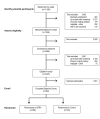A randomized trial of genetic and environmental risk assessment (GERA) for colorectal cancer risk in primary care: trial design and baseline findings
- PMID: 20828635
- PMCID: PMC3006063
- DOI: 10.1016/j.cct.2010.08.013
A randomized trial of genetic and environmental risk assessment (GERA) for colorectal cancer risk in primary care: trial design and baseline findings
Abstract
Purpose: This paper describes an ongoing randomized controlled trial designed to assess the impact of genetic and environmental risk assessment (GERA) on colorectal cancer (CRC) screening.
Methods: The trial includes asymptomatic patients who are 50-79years and are not up-to-date with CRC screening guidelines. Patients who responded to a baseline telephone survey are randomized to a GERA or Control group. GERA group participants meet with a nurse, decide whether to have a GERA blood test (a combination of genetic polymorphism and folate), and, if tested, receive GERA feedback. Follow-up telephone surveys are conducted at 1 and 6months. A chart audit is performed at 6months.
Results: Of 2,223 eligible patients, 562 (25%) have enrolled. Patients who enrolled in the study were significantly younger than those who did not (p<0.001). Participants tended to be 50-59years (64%), female (58%), white (52%), married (51%), and have more than a high school education (67%). At baseline, most participants had some knowledge of CRC screening and GERA, viewed CRC screening favorably, and reported that they had decided to do screening. Almost half had worries and concerns about CRC.
Conclusions: One in four eligible primary care patients enrolled in the study. Age was negatively associated with enrollment. Prospective analyses using data for all participants will provide more definitive information on GERA uptake and the impact of GERA feedback.
Copyright © 2010 Elsevier Inc. All rights reserved.
Figures
References
-
- American Cancer Society . Cancer facts and figures 2008. American Cancer Society; Atlanta, GA: 2008. pp. 10–3.
-
- U.S. Department of Health and Human Services Healthy people 2010: Objectives for improving health. Washington, DC: U.S. Government Printing Office; [cited 2009 Sep 1]. 2000. Cancer. pp. 3–24. Available from: http://www.healthypeople.gov/Document/HTML/Volume1/03Cancer.htm.
-
- National Center for Chronic Disease Prevention & Health Promotion Behavioral Risk Factor Surveillance System. BRFSS Prevalence and Trends Data. Colorectal Cancer Screening - 2008. [cited 2009 April 30]. Last reviewed May 15, 2009. Available from: http://www.cdc.gov/brfss/
-
- Mitka M. Colorectal cancer screening rates still fall far short of recommended levels. JAMA. 2008;299:622. - PubMed
-
- Myers RE, Ross EA, Wolf TA, Balshem A, Jepson C, Millner L. Behavioral interventions to increase adherence in colorectal cancer screening. Medical Care. 1991;29:1039–50. - PubMed
Publication types
MeSH terms
Substances
Grants and funding
LinkOut - more resources
Full Text Sources
Other Literature Sources
Medical


